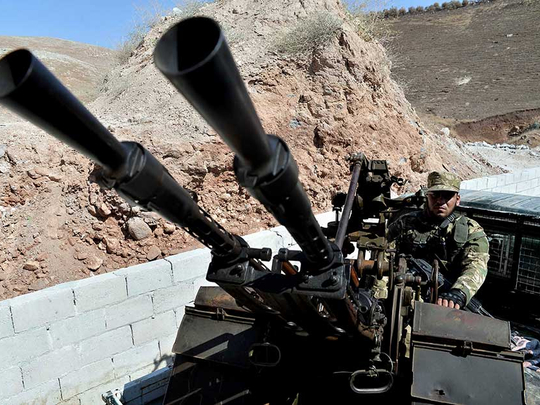
Istanbul: Syrian rebel groups will complete the withdrawal of heavy weaponry from a demilitarised zone agreed by Turkey and Russia in northwest Syria’s Idlib on Monday, the state-owned Anadolu news agency said.
Under a deal agreed last month between Turkey and Syrian President Bashar Al Assad’s main ally Moscow, rebels deemed as radicals are required to withdraw by the middle of this month from the zone, and heavy weaponry must be withdrawn by October 10.
The Turkey-backed National Front for Liberation (NFL) rebel alliance said on Saturday that the process of withdrawing heavy weapons had begun.
Turkish Broadcaster NTV said on Monday a large proportion of the mortars, artillery and missile ramps in the area had already been withdrawn.
Other Syrian rebels are due to remain within the demilitarised zone to assist Turkish troops monitoring and patrolling the area, the NFL has said.
The Turkey-Russia agreement halted a threatened Syrian government offensive. The United Nations had warned such an attack would create a humanitarian catastrophe in the Idlib region, home to about three million people.
The main terrorist group in the Idlib area, Tahrir Al Sham, has yet to say whether it will comply with the agreement.
Tens of thousands of Syrians in areas recaptured by government troops this year remain starved of humanitarian aid, with the relief agencies helping them for years now unable to reach them.
As towns switched from opposition to government control, international aid groups were forced to halt their crucial health, food and protection services as they had no government authorisation to work.
Since April this has left vulnerable civilians in Syria’s south, Eastern Ghouta near Damascus, and rural parts of Homs province without the vital support they once relied on.
“In total, tens of thousands of people are impacted by the halt in humanitarian aid,” said Joelle Bassoul, spokeswoman for CARE International, which used to send aid into rebel-held areas.
“In effect, when we stop operating, it means our partners have stopped operating and have no more humanitarian capacity in the given area.”
More than seven years into Syria’s conflict, 13 million people across the country still need humanitarian assistance, says the United Nations.
Aid became politicised early on, and two separate operations developed.
One, based out of Damascus, saw the UN and other agencies providing assistance solely with government authorisation.
Meanwhile, NGOs based in Turkey or Jordan helped civilians in rebel areas through a parallel system, without regime approval.
This year President Al Assad brought many of those areas under government control through a string of military victories, forcing those international agencies to pull out.












